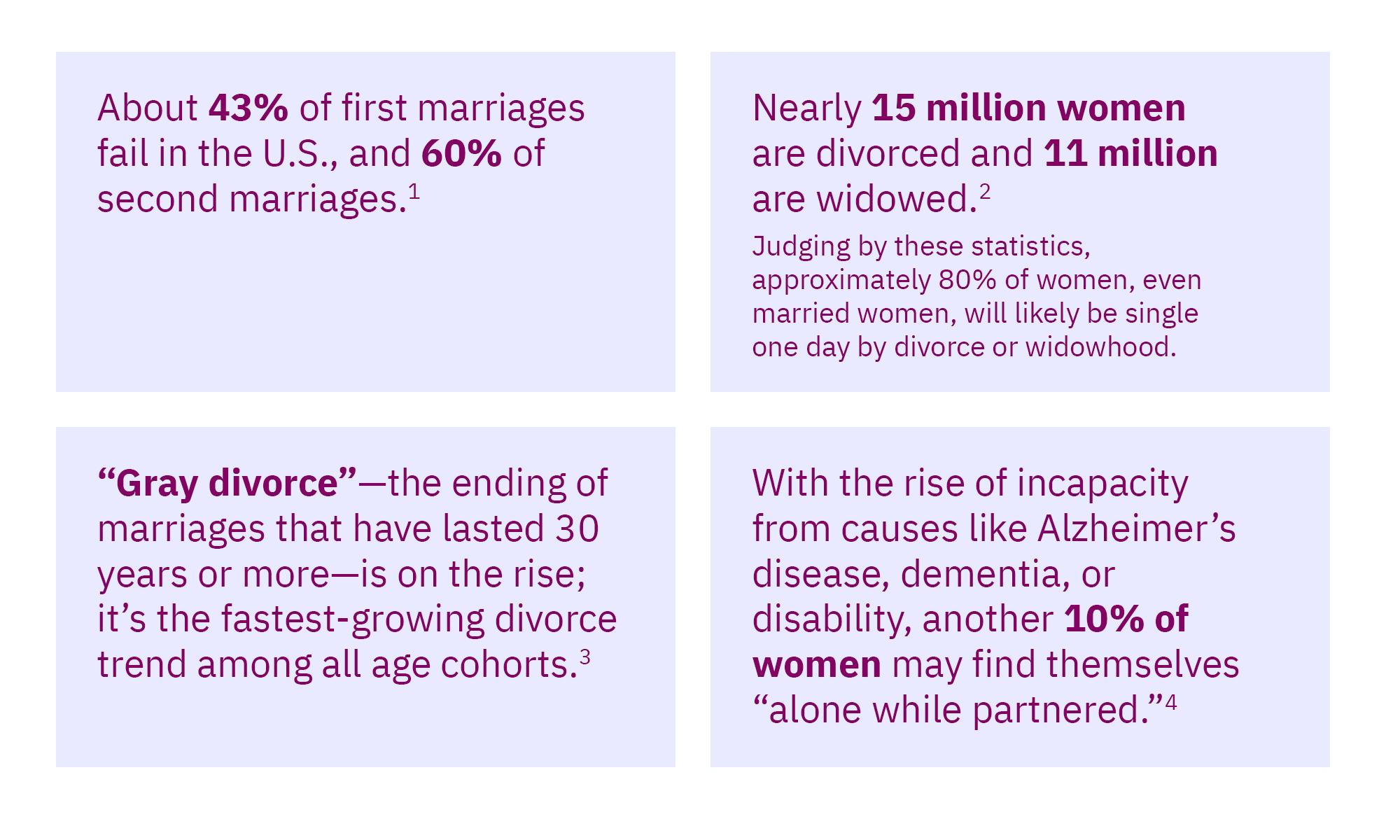Since the odds are high that most women will likely become single at some point in their lives, even if currently married, it’s crucial to take the time to understand your finances.
What can you do to empower yourself if you’ve become, or could become, solely responsible for your finances? And how can you feel confident in managing this critical part of your life?
If you aren’t single now, it’s important to be proactive before a life-changing event occurs (like divorce, death of a spouse, or a major health diagnosis). Having a good handle on your assets and expenses while life is going smoothly can provide reassurance in times of stress.
One of the first steps is reviewing your estate plan and updating it as appropriate. It’s not ideal to discover after a major life event that your current intentions and wishes are not included in your estate plan documents. And be sure to review your estate plan at least once a year.

Financial advice for widows
Because losing your spouse is an emotionally tough time, managing financial tasks may feel almost impossible. In addition to consulting with your wealth advisor, ask for help from a trusted family member or close friend. To make it help easier for them to aid, consider taking the following steps:
- Gather all relevant documents, such as a will or trust, life insurance policy, birth certificate, marriage certificate, death certificate (order at least 12 from the funeral home as you will need them to claim benefits), your spouse’s Social Security card, investment account statements, and retirement or pension plan statements.
- Talk with your estate planning attorney to review your spouse’s will or trust and address beneficiary distributions.
- Contact financial institutions and begin changing the name on the accounts, as needed.
- Notify the Social Security Administration of your spouse’s passing to claim the death benefit and see if your spousal/survivor benefits need to be adjusted.
- Send a letter to all three credit bureaus to get copies of your spouse’s credit reports to make sure you’re aware of all existing debts.
- File claims for any outstanding medical care benefits with your spouse’s health insurance provider.
Financial advice for divorcées
Like losing a spouse to death, it can be emotionally draining and painful to go through a divorce. But it can also be more challenging if you and your spouse don’t agree on how money should be handled, either during the marriage or the divorce process. Take the following important steps to prepare and help protect yourself:
- Organize your financial records; make copies of documents and store them in a secure place where only you have access.
- Start putting money away for legal and other professional fees. You also need to cover your day-to-day living expenses, keeping in mind that the divorce process can take longer and cost more than anticipated.
- Open new accounts, preferably at institutions where you don’t have joint accounts.
- Get a copy of your credit report to monitor your credit and make sure joint debt is not being accrued on existing accounts.
- If you are going through a divorce, update your will, health care directives, and beneficiary information first, before the divorce is finalized. You likely don’t want your future ex-spouse to make medical decisions on your behalf or inherit your assets. Revising your estate planning documents can wait until after the divorce is final, if needed.
You got this
Whether you’re currently trying to navigate a difficult change in your life or want to be prepared for one, the time you invest to understand your finances is a gift to you — and your loved ones — that will keep on giving. Especially if you have daughters, it’s an opportunity to lead by example and show them how to take control of their financial independence. Share the knowledge you gain and have open communication with them to help with their feelings of empowerment, as well.
Use your wealth advisor as a resource. He or she can help you understand your financial situation and run through “what-if” scenarios to aid in getting you comfortable with your finances. And whatever the future may bring, your advisor can also help with evolving and adapting both your financial plans and estate plans.
Understanding and taking control of your finances will help with feeling assurance and making good decisions as your life goes through changes, whether you’re a suddenly single woman or become one in the future.
If you are not a Mercer Advisors client and would like to increase your financial knowledge and confidence so you can handle life’s challenges as a single woman, let’s talk.
1. “Revealing Divorce Statistics in 2024,” Forbes Advisor, May 30, 2024.
2.“Marital status of the United States population in 2022,” Statista, Aug. 29, 2023.
3.“Gray Divorce Is Skyrocketing,” Forbes, May 7, 2024.
4.“Dementia & Alzheimer’s Disease Statistics and Facts,” The Center for Advancing Health, Jan. 11, 2024.




